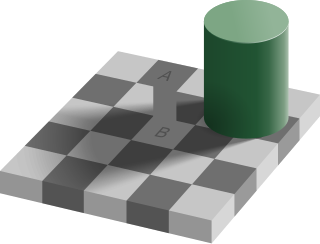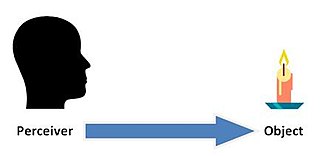Related Research Articles

Sir Alfred Jules "Freddie" Ayer was an English philosopher known for his promotion of logical positivism, particularly in his books Language, Truth, and Logic (1936) and The Problem of Knowledge (1956).

In philosophy, empiricism is an epistemological view which holds that true knowledge or justification comes only or primarily from sensory experience and empirical evidence. It is one of several competing views within epistemology, along with rationalism and skepticism. Empiricists argue that empiricism is a more reliable method of finding the truth than purely using logical reasoning, because humans have cognitive biases and limitations which lead to errors of judgement. Empiricism emphasizes the central role of empirical evidence in the formation of ideas, rather than innate ideas or traditions. Empiricists may argue that traditions arise due to relations of previous sensory experiences.
Idealism in philosophy, also known as philosophical idealism or metaphysical idealism, is the set of metaphysical perspectives asserting that, most fundamentally, reality is equivalent to mind, spirit, or consciousness; that reality is entirely a mental construct; or that ideas are the highest form of reality or have the greatest claim to being considered "real". Because there are different types of idealism, it is difficult to define the term uniformly.
In philosophy, physicalism is the view that "everything is physical", that there is "nothing over and above" the physical, or that everything supervenes on the physical. Physicalism is a form of ontological monism—a "one substance" view of the nature of reality as opposed to a "two-substance" or "many-substance" (pluralism) view. Both the definition of "physical" and the meaning of physicalism have been debated.

The philosophy of perception is concerned with the nature of perceptual experience and the status of perceptual data, in particular how they relate to beliefs about, or knowledge of, the world. Any explicit account of perception requires a commitment to one of a variety of ontological or metaphysical views. Philosophers distinguish internalist accounts, which assume that perceptions of objects, and knowledge or beliefs about them, are aspects of an individual's mind, and externalist accounts, which state that they constitute real aspects of the world external to the individual. The position of naïve realism—the 'everyday' impression of physical objects constituting what is perceived—is to some extent contradicted by the occurrence of perceptual illusions and hallucinations and the relativity of perceptual experience as well as certain insights in science. Realist conceptions include phenomenalism and direct and indirect realism. Anti-realist conceptions include idealism and skepticism. Recent philosophical work have expanded on the philosophical features of perception by going beyond the single paradigm of vision.
Solipsism is the philosophical idea that only one's mind is sure to exist. As an epistemological position, solipsism holds that knowledge of anything outside one's own mind is unsure; the external world and other minds cannot be known and might not exist outside the mind.
Intentionality is the power of minds to be about something: to represent or to stand for things, properties and states of affairs. Intentionality is primarily ascribed to mental states, like perceptions, beliefs or desires, which is why it has been regarded as the characteristic mark of the mental by many philosophers. A central issue for theories of intentionality has been the problem of intentional inexistence: to determine the ontological status of the entities which are the objects of intentional states.

John Henry McDowell is a South African philosopher, formerly a fellow of University College, Oxford, and now university professor at the University of Pittsburgh. Although he has written on metaphysics, epistemology, ancient philosophy, nature, and meta-ethics, McDowell's most influential work has been in the philosophy of mind and philosophy of language. McDowell was one of three recipients of the 2010 Andrew W. Mellon Foundation's Distinguished Achievement Award, and is a Fellow of both the American Academy of Arts & Sciences and the British Academy.

John Langshaw Austin, OBE, FBA was a British philosopher of language and leading proponent of ordinary language philosophy, best known for developing the theory of speech acts.
In metaphysics, phenomenalism is the view that physical objects cannot justifiably be said to exist in themselves, but only as perceptual phenomena or sensory stimuli situated in time and in space. In particular, some forms of phenomenalism reduce all talk about physical objects in the external world to talk about bundles of sense data.

Subjective idealism, or empirical idealism or immaterialism, is a form of philosophical monism that holds that only minds and mental contents exist. It entails and is generally identified or associated with immaterialism, the doctrine that material things do not exist. Subjective idealism rejects dualism, neutral monism, and materialism; it is the contrary of eliminative materialism, the doctrine that all or some classes of mental phenomena do not exist, but are sheer illusions.

The Critique of Pure Reason is a book by the German philosopher Immanuel Kant, in which the author seeks to determine the limits and scope of metaphysics. Also referred to as Kant's "First Critique", it was followed by his Critique of Practical Reason (1788) and Critique of Judgment (1790). In the preface to the first edition, Kant explains that by a "critique of pure reason" he means a critique "of the faculty of reason in general, in respect of all knowledge after which it may strive independently of all experience" and that he aims to reach a decision about "the possibility or impossibility of metaphysics". The term "critique" is understood to mean a systematic analysis in this context, rather than the colloquial sense of the term.

Transcendental idealism is a philosophical system founded by German philosopher Immanuel Kant in the 18th century. Kant's epistemological program is found throughout his Critique of Pure Reason (1781). By transcendental Kant means that his philosophical approach to knowledge transcends mere consideration of sensory evidence and requires an understanding of the mind's innate modes of processing that sensory evidence.

In philosophy of perception and epistemology, naïve realism is the idea that the senses provide us with direct awareness of objects as they really are. When referred to as direct realism, naïve realism is often contrasted with indirect realism.

In the philosophy of perception and philosophy of mind, direct or naïve realism, as opposed to indirect or representational realism, are differing models that describe the nature of conscious experiences; out of the metaphysical question of whether the world we see around us is the real world itself or merely an internal perceptual copy of that world generated by our conscious experience.

In the philosophy of mind, the hard problem of consciousness is to explain why and how humans and other organisms have qualia, phenomenal consciousness, or subjective experience. It is contrasted with the "easy problems" of explaining why and how physical systems give a (healthy) human being the ability to discriminate, to integrate information, and to perform behavioral functions such as watching, listening, speaking, and so forth. The easy problems are amenable to functional explanation—that is, explanations that are mechanistic or behavioral—since each physical system can be explained purely by reference to the "structure and dynamics" that underpin the phenomenon.

The dream argument is the postulation that the act of dreaming provides preliminary evidence that the senses we trust to distinguish reality from illusion should not be fully trusted, and therefore, any state that is dependent on our senses should at the very least be carefully examined and rigorously tested to determine whether it is in fact reality.

The philosophy of color is a subset of the philosophy of perception that is concerned with the nature of the perceptual experience of color. Any explicit account of color perception requires a commitment to one of a variety of ontological or metaphysical views, distinguishing namely between externalism/internalism, which relate respectively to color realism, the view that colors are physical properties that objects possess, and color fictionalism, the view that colors possess no such physical properties.
The theory of sense data is a view in the philosophy of perception, popularly held in the early 20th century by philosophers such as Bertrand Russell, C. D. Broad, H. H. Price, A. J. Ayer, and G. E. Moore. Sense data are taken to be mind-dependent objects whose existence and properties are known directly to us in perception. These objects are unanalyzed experiences inside the mind, which appear to subsequent more advanced mental operations exactly as they are.
Louis Arnaud Reid was a British philosopher who held the foundation chair in Philosophy of Education at the London University Institute of Education. He was a founding contributor to the British Journal of Aesthetics, and is best known for his writings on epistemology and aesthetics. He influenced figures as diverse as Susanne Langer, Lionel Trilling and Harold Osborne. Jacques Barzun said that Reid's book A Study in Aesthetics was "the best discussion of art yet produced in our century."
References
- ↑ Huemer, M. "Sense data". Stanford Encyclopedia of Philosophy. Retrieved 11 October 2018.
- ↑ Ayer, A.J., The Foundations of Empirical Knowledge. New York: Macmillan, 1940.
- ↑ Austin, J. L. "Sense and Sensibilia", Oxford: Clarendon. 1962.
- ↑ Putnam, Hilary The Threefold Cord: Mind, Body, and World. New York: Columbia University Press, 1999.